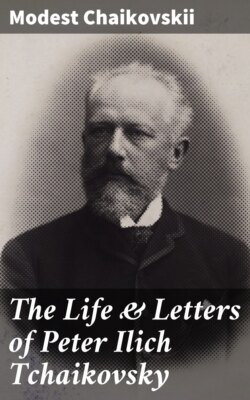Читать книгу The Life & Letters of Peter Ilich Tchaikovsky - Chaikovskii Modest - Страница 31
На сайте Литреса книга снята с продажи.
Оглавление“Interlaken.
“We have been here three days, and shall probably remain a whole month.... The crush in the railway carriages was indescribable, and it was very difficult to get anything to eat and drink. Thank God, however, here we are in Switzerland, where everything goes on in its normal course. Dear Modi, I cannot tell you what I feel in the presence of these sublime beauties of Nature, which no one can imagine without beholding them. My astonishment, my admiration, pass all bounds. I rush about like one possessed, and never feel tired. Volodi, who takes no delight in Nature, and is only interested in the Swiss cheeses, laughs heartily at me. What will it be like a few days hence, when I shall scramble through the passes and over glaciers by myself! I return to Russia at the end of August.”
Tchaikovsky spent six weeks in Switzerland, and then went on to Munich, where he stayed two days with his old friend Prince Galitsin. From thence he returned to St. Petersburg by Vienna, which delighted him more than any other town in the world. From Petersburg he went direct to Moscow in order to take up his work at the Conservatoire.
During the whole of his trip abroad Tchaikovsky, according to his own account, did no serious work beyond revising his overture Romeo and Juliet. Thanks to the exertions of N. Rubinstein and Professor Klindworth, the overture, in its new form, was published in Berlin the following season, and soon found its way into the programmes of many musical societies in Germany.
“Karl Klindworth came from London to Moscow in 1868,” says Laroche. “He was then thirty-eight, and at the zenith of his physical and artistic powers. He was tall and strongly built, with fair hair and bright blue eyes. His appearance accorded with our ideas of the Vikings of old; he was, in fact, of Norwegian descent. He cordially detested London, where he had lived many years, although he spoke English fluently. London was at that time quite unprepared for the Wagnerian propaganda, and, apart from this, life had neither meaning nor charm for Klindworth. As a pupil of Bülow and Liszt, he had been devoted to the Wagnerian cult from his youth. He was invited by Nicholas Rubinstein to come to Moscow as teacher of the pianoforte; but he was not popular, either as a pianist, or in society.... It would seem as though there could be no common meeting-ground between this Wagnerian fanatic and Tchaikovsky. If one desired to be logical, it would further appear that, as a composer, Tchaikovsky would not only fail to interest Klindworth, but must seem to him quite in the wrong, since Wagner has written that concert and chamber music have long since had their day. But luckily men are devoid of the sense of logical sequence, and Klindworth proved a man of far more heart than one would have thought at first sight. Tchaikovsky charmed him from the first, not merely as a man, but as a composer. Klindworth was one of the first to spread Tchaikovsky’s works abroad. It was owing to him that they became known in London and New York; and it was through him also that Liszt made acquaintance with some of them. In Klindworth, Tchaikovsky found a faithful but despotic friend. Speaking picturesquely, Peter Ilich trembled before him like an aspen-leaf, did not dare openly to give his real opinions upon the composer of the Nibelungen Ring, and I believe he embellished as far as possible the views expressed in his articles from Bayreuth in order not to irritate Klindworth.”
While I am mentioning the important event of Tchaikovsky’s earliest introduction to Western Europe, I must recall the prophetic words of a young critic, then at the outset of his career. Five years before the appearance of the overture Romeo and Juliet, in 1866, Laroche had written to his friend:—
“Your creative work will not really begin for another five years; but these mature and classic works will surpass all that we have produced since Glinka’s time.”
Being no musical critic, it is not for me to say whether, in truth, in all Russian musical literature nothing so remarkable as Romeo and Juliet had appeared since Glinka. I can only repeat what has been said by many musical authorities—that my brother’s higher significance in the world of art dates from this work. His individuality is here displayed for the first time in its fulness, and all that he had hitherto produced seems—as in Laroche’s prophecy—to have been really preparatory work.
